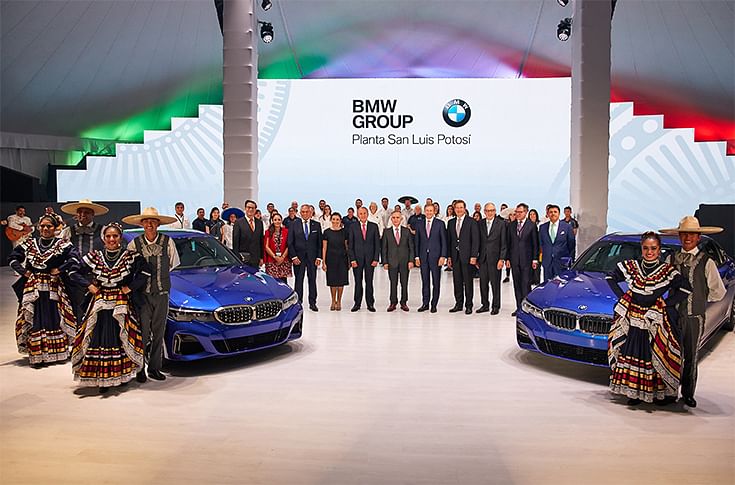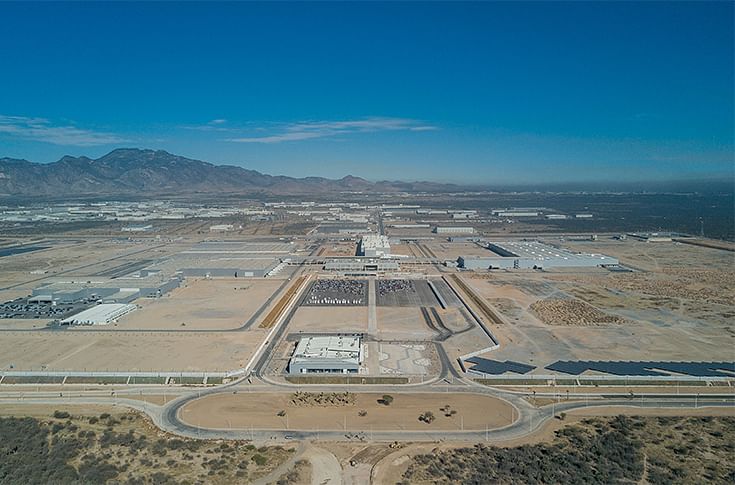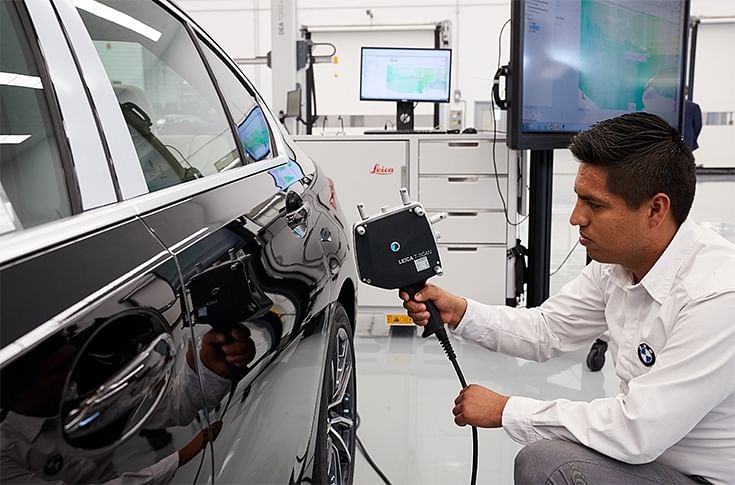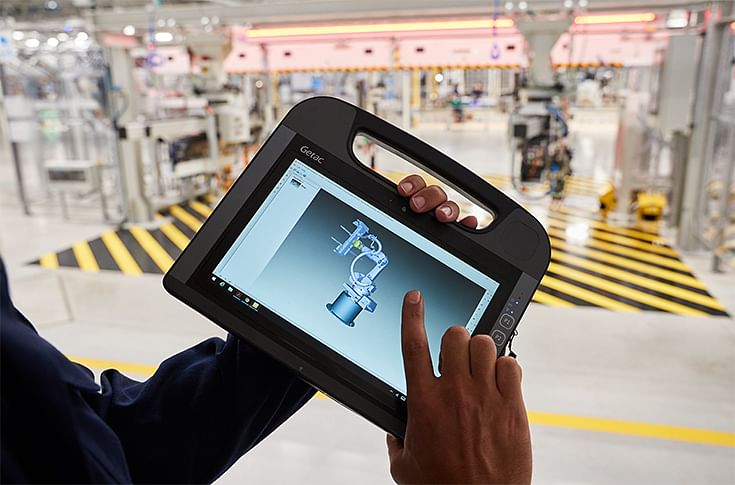BMW celebrates 25th anniversary in Mexico with a new plant
BMW opens its 31st global manufacturing plant in Mexico that is aimed to further promote its green initiatives and support its sales and production network in the American region.
BMW Group has officially opened the company’s new automotive plant in San Luis Potosi in Mexico. The company has invested more than one billion US dollars in the new production location. The plant, which already employs 2,500 people, will have a capacity of up to 175,000 units per year once the ramp-up phase is fully completed. The plant will build BMW 3 series sedan cars for not just the Mexican markets but also for the Latin American markets.
The ceremony in San Luis Potosi was attended by guests including Dr Alfonso Romo Garza, head of the office of the Presidency of the Mexican Republic; Dr Juan Manuel Carreras Lopez, governor of the state of San Luis Potosi; Oliver Zipse, member of the board of management of BMW responsible for production; Milagros Caina-Andree, member of the Board of Management of BMW AG responsible for Human Resources and Labour Relations, and Dr Andreas Wendt, member of the Board of Management of BMW AG responsible for Purchasing and Supplier Network.

Grand Opening of BMW Group Plant San Luis Potosi with Hermann Bohrer, President and CEO of BMW Group Plant San Luis Potosi (3rd left), Milagros Caina-Andree, member of the Board of Management of BMW AG responsible for Human Resources and Labour Relations (4th left), Dr Juan Manuel Carreras Lopez, governor of the state of San Luis Potosi (5th left), Dr Alfonso Romo Garza, Head of the Office of the Presidency of the Mexican Republic (6th left), Oliver Zipse, member of the Board of Management of BMW responsible for Production (7th left), Manfred Schoch, chairman of the General Works Council (8th left) and Dr Andreas Wendt, member of the Board of Management of BMW responsible for Purchasing and Supplier Network (9th left)
The plant is working with four technical institutes in this area and is claimed that already 250 apprentices in technical occupations have been trained. At an innovative new training centre on the plant grounds, all new staff and apprentices are trained in the BMW Group’s latest production processes and technologies, based on the dual vocational training model.

Aerial view of BMW Group Plant San Luis Potosi, Mexico
Head of human resources Milagros Caina-Andree highlighted the BMW Group’s strong commitment to vocational education: “Our highly-trained employees form a strong foundation for our new BMW Group Plant San Luis Potosi and help us meet high-quality standards for our premium products. Our dual vocational training programme is already in its fourth generation.”
Dr Andreas Wendt, member of the board of management of BMW AG responsible for Purchasing and Supplier Network: “We have a strong supplier base we can build on in Mexico, having sourced high-quality, technologically sophisticated and innovative products from here for more than ten years. Every BMW Group vehicle today already contains at least one part from one of our 220 Mexican suppliers. Our new plant will benefit from short supply routes and the high level of flexibility this gives our supply chain.”

Laser-based quality check at the BMW Group plant SLP
The BMW Group has operated its own local purchasing office in Mexico since 2008. In 2017, the office relocated from Mexico City to San Luis Potosi, where it now employs 105 people. The BMW Group’s purchasing volume in Mexico reached $2.5 billion last year.
Hermann Bohrer, director of the Mexican plant: “The plant was designed from the start to allow us to respond quickly and flexibly to future model variants and production volumes. We use innovative Industry 4.0 technologies, including new automation solutions and modern assistance systems. Sustainability was also a major focus from the beginning – and we are setting new standards in this area.”

Smart maintenance at the BMW Group plant SLP
The BMW Group used digital 3D plans during construction of the plant, both for the building itself and for the installation of equipment. During every phase of construction, architects entered specific information, such as location, dimensions and completion date into digital models. Digital 3D-scanning technology was also used during construction for the first time. BMW claims that combining these two technologies allowed for real-time analysis of construction progress and cost-efficient modifications, providing the Group with continuous planning reliability.
The new BMW Group plant is said to be a pioneer in the field of intelligent maintenance. ‘Smart Maintenance Assistant’ software is being used for the first time, enabling proactive maintenance throughout the plant to be planned ahead of time, thereby increasing equipment availability. Service activities are based on current, intelligently organised system data instead of predefined maintenance intervals. Using smart devices such as tablets and smartphones, staff receive all relevant information regarding equipment status.
Various Industry 4.0 technologies are used, for example, in assembly, where screens have largely replaced paper throughout the assembly process. Two screens per takt provide staff with all the information they need – information which, in the past, was only available on paper. This digital job card is being used for the first time at the BMW Group plant in Mexico.
Robots and employees work directly alongside one another in engine pre-assembly, cooperating in a way which plays to the strengths of each. Robots have the power to turn the heavy convertor, while the employees have the manual dexterity to make the final adjustments to fit them together precisely.
Leaning towards green initiatives
The site, with the production network’s lowest water consumption per vehicle produced, will be the BMW Group’s first paint shop to generate no process wastewater at all. The water needed for the painting process is reconditioned and reused.
The use of renewable energy sources ensures that the plant will be supplied with 100 percent CO2-free electricity in future. A solar energy plant on-site, covering an area of more than 70,000 sq.m, will produce part of the energy.
Mexico gets BMW’s 31st global production plant
The new plant in Mexico expands the BMW Group production network to a total of 31 locations. In line with the BMW Group’s Strategy ‘NUMBER ONE > NEXT’, this ensures the company has a flexible and efficient international production network, with a good balance of value creation between Europe, Asia and the Americas.
Mexico is a member of the NAFTA free-trade area with Canada and the United States. It also has a large number of free-trade agreements, including with the European Union and MERCOSUR, which make it easier to export cars and import supplied parts.
The NAFTA region in particular, with its consistently high sales volumes, is a key market for the BMW Group. Twenty-five years ago, the BMW Group opened its plant in Spartanburg, USA, and has since invested nearly nine billion US dollars in the site. The company will invest a further 600 million US dollars there by 2021 to gear it up for future generations of the BMW X models. The number of jobs will increase in parallel to around 11,000. In total, the company supports almost 70,000 direct and indirect jobs in the US.
In 2018, the BMW Group sold a total of 25,090 vehicles (18,501 BMW, 6,589 MINI) in Mexico – an increase of more than 13% over the previous year.
Also read: BMW Group India clocks highest-ever Q1 sales – 2,982 units, up 19%
BMW Group and Microsoft launch Open Manufacturing Platform
RELATED ARTICLES
Autoliv Plans JV for Advanced Safety Electronics With China’s HSAE
The new joint venture, which is to be located strategically near Shanghai and close to several existing Autoliv sites in...
JLR to Restart Production Over a Month After September Hacking
Manufacturing operations at the Tata Group-owned British luxury car and SUV manufacturer were shut down following a cybe...
BYD UK Sales Jump 880% in September to 11,271 units
Sales record sets the UK apart as the largest international market for BYD outside of China for the first time. The Seal...






 By Autocar Professional Bureau
By Autocar Professional Bureau
 07 Jun 2019
07 Jun 2019
 9640 Views
9640 Views








































 Ajit Dalvi
Ajit Dalvi




